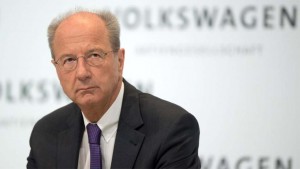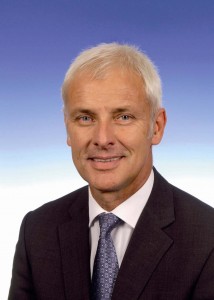Unable to meet increasingly rigid U.S. emissions standards, a “very limited group…acted irresponsibly,” said Volkswagen Chairman Hans Dieter Poetsch, in an interim report on the carmaker’s internal investigation of its diesel emissions cheating.
VW is facing billions of dollars in fines and other costs related to the scandal which was triggered by the revelation in September that it installed a so-called “defeat device” in nearly 500,000 vehicles sold in the U.S. between 2009 and 2015, and more than 11 million models sold worldwide.
“We are not talking about a one-off mistake, but a whole chain of mistakes that was not interrupted at any point along the time line,” Poetsch said during a meeting with reporters at VW’s headquarters in Wolfsburg, Germany.
More than 2,000 employees have been notified to preserve everything on their computers, USB drives and other storage devices, and internal investigators have already gone through data for 400 of those employees, Poetsch revealed.
His comments reflected those made by Michael Horn, the chief executive of Volkswagen Group of America, who told Congressional investigators in October that a “small group” of engineers appeared to be responsible for the subterfuge.
But while the new, interim report contends senior executives, including members of the Volkswagen board, were unaware of the cheating, several senior executives have been forced out, including former VWAG CEO Martin Winterkorn, and Audi R&D boss Ulrich Hackenberg, who formally resigned this week.
The U.S. Environmental Protection Agency kicked off the crisis when it reported finding illegal software used in the engine control modules for 482,000 vehicles sold in the U.S. using VW’s 2.0-liter turbodiesel. The maker soon confirmed the problem, adding that the “defeat device” was installed on 11 million vehicles sold worldwide.
It now appears that engineers decided to take the shortcut after failing to find a solution allowing them to meet U.S. standards for emissions of smog-causing oxides of nitrogen, or NOx, within their “timeframe and budget.” The cheating continued even when a technical solution eventually was found.
What was done, in part, due to budget problems could prove to be the costliest crisis in Volkswagen history. The maker faces as much as $18 billion in fines for cheating on the 2.0-liter diesel, as well as potentially large penalties to settle an ongoing investigation by the U.S. Department of Justice.
Meanwhile, a federal court in San Francisco has been chosen to hear more than 450 lawsuits against the maker that could result in billions more in claims.
(Judicial panel decides to consolidate VW suits in California court. Click Here for the full story.)
VW has already seen a slump in sales, especially in the U.S. market, but it hasn’t been quite as bad as some were forecasting, stated Matthias Mueller, who replaced Winterkorn as VW CEO nearly three months ago.
“The situation is not dramatic, but as expected it is tense,” he said during the news conference, adding, “We are fighting for every customer and every car.”
One of the big questions is how much the scandal will hurt VW long-term. The maker has set aside more than $7 billion to cover potential costs, but it has also lined up a $20 billion line of credit. But that has reportedly required it to pledge it will sell assets, if necessary, to repay the consortium of banks making the loan.
(GM victim fund pays out $600 mil in ignition switch scandal. Click Here for the latest.)
At a meeting with 20,000 workers from the massive VW manufacturing center in Wolfsburg two weeks ago, members of the families that control the automaker said they aim to avoid cutting jobs as a result of the scandal, but at the Thursday news conference, company officials warned there could be “an impact on the number of temporary workers.”
Part of the problem is that while a fix for the software cheating will be launched in much of the world starting in January, VW has yet to lock down the repairs necessary to bring its diesels into compliance with U.S. emissions laws.
Among other things, that means it still can’t sell the diesel-powered vehicles that have accounted for about a quarter of its American sales.
Going forward, Poetsch said VW will take steps to “prevent something like this from ever happening again.” Among other things, it will use independent, third-party labs to verify test results – and will also run on-road tests to make sure the results can be duplicated in the real world.
That’s critical because the “defeat devices” were designed to detect when the diesel vehicles were being tested in a lab – among other things by recognizing that no one was turning the steering wheel. In real-world conditions, the vehicles were allowed to produce up to 40 times more NOx than the standard permits.
“We hope that will help us win back trust,” Poetsch said.
For his part, CEO Mueller stressed that VW intends to push through the crisis and get back to business.
“We will not allow the crisis to paralyze us,” Mueller promised. “Although the current situation is serious, this company will not be broken by it.”
(Click Here for details about additional cheating VW has admitted to.)



Honesty would have been the best course of action; and did they think this would never be discovered?
It appears that VW management was blindsided by the discovery of the improper software in the four cyl. EA 189 diesel engines. By all accounts VW has been 100% cooperative and honest with all agencies since they determined the software issue was real. There is no indication that anyone in VW executive management was aware of the improper software. Two independent investigations have indicated that they believe between 10-30 people are responsible.
The over-reaction by so many regarding this trivial emissions issue is incomprehensible compared to the 100+ deaths resulting from the defective GM ignition switch issue and reportedly mid-level management cover up. Which issue appears to be more significant a minor emissions violation or 100 deaths?
The knee-jerk reaction by the EPA has cost many innocent people dearly and turned their lives upside down over literally nothing of significance in spite of the fact these people had nothing to do with the software issue. The vindictive actions of the EPA and many others with over 450+ lawsuits illustrates what unscrupulous gold diggers will do when they see an opportunity to steal money from someone else. The money they are stealing is eliminating the working man’s jobs at VW, it’s suppliers, it’s dealers and anyone else associated with VW – all over a trivial exhaust emissions violation. Anyone who can’t smell this assault on VW is in serious denial. Fining a company for the misdeeds of a few people is reasonable. Financially damaging a company so badly that it negatively impacts the economy of the EU as well as the U.S. is just plain stupid. Perhaps the lawsuits against the EPA for their over reaction will prevent such insanity from happening in the future because it’s so damaging to a lot more innocent people than the general public and media understand from the “piling on” mentality.
Break the company up completely….disband the idea of Hitler’s “People Car” once and for all…this company should not have existed beyond May of 1945 just because of the Polish and Czech slave laborers forced to build the first products, a pox on them!
Still fighting the war, Chris? You’re about six decades out of touch with reality. Maybe you should enroll in a history course to get your facts straight?
You probably have no issues with Apple, Microsoft, Acer and many other companies using Chinese slave labor to produce the latest electronic toys that they sell in the U.S., do you? How about GM importing Buick models built in China with essentially slave labor, for sale in the U.S.? This after GM got billions in U.S. tax dollars for a bailout to save them from their mismanagement and extinction, while they continue to export U.S. jobs. That’s OK with you, right?